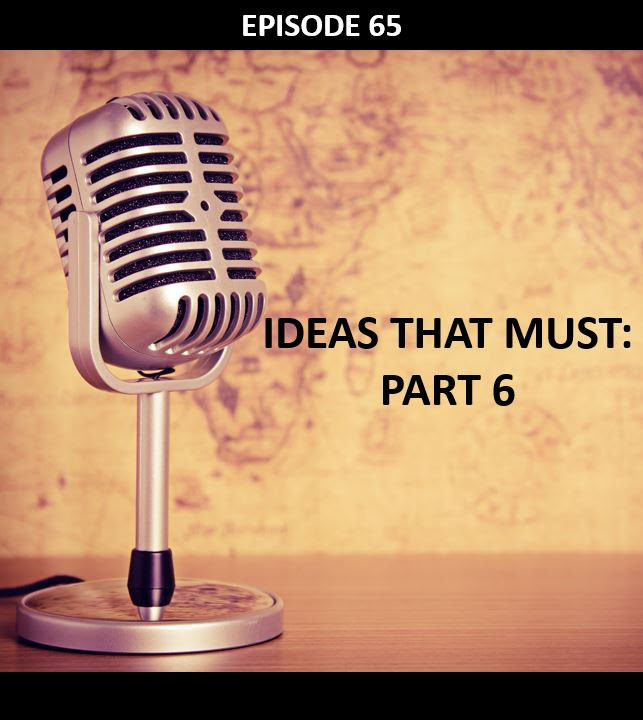The AGC have just issued a media release to promote the release of the latest Tertiary Education Geoscience report. This is a 5 yearly snapshot of the state of our university education system and when combined with the previous reports shows a long term decline in university enrolments.
You can see the announcement here https://www.agc.org.au/news/media-releases/ and the link direct to the media statement here https://www.agc.org.au/wp-content/uploads/2023/01/Urgent-action-needed-to-stem-slump-in-geoscience-graduates.pdf
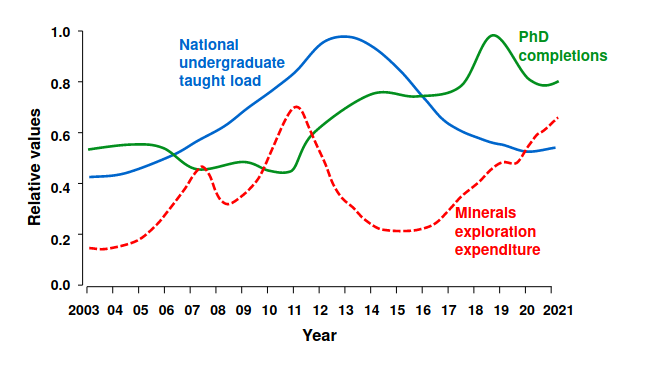

EP#68 – The BHP Xplor Program with Sonia Scarselli
On this episode, we are joined by Sonia Scarselli, VP of BHP Xplor, a programme initiated by BHP that is dedicated to accelerating innovative, early-stage mineral exploration start-ups to find the critical resources necessary to drive the energy transition.
The BHP Explor Program is searching around the globe for the next generation of explorers that are ready to think about the earth’s minerals systems differently to unlock copper, nickel, and other critical mineral deposits.
Join us and let’s explore.
#ExplorationRadio

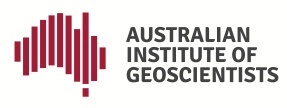
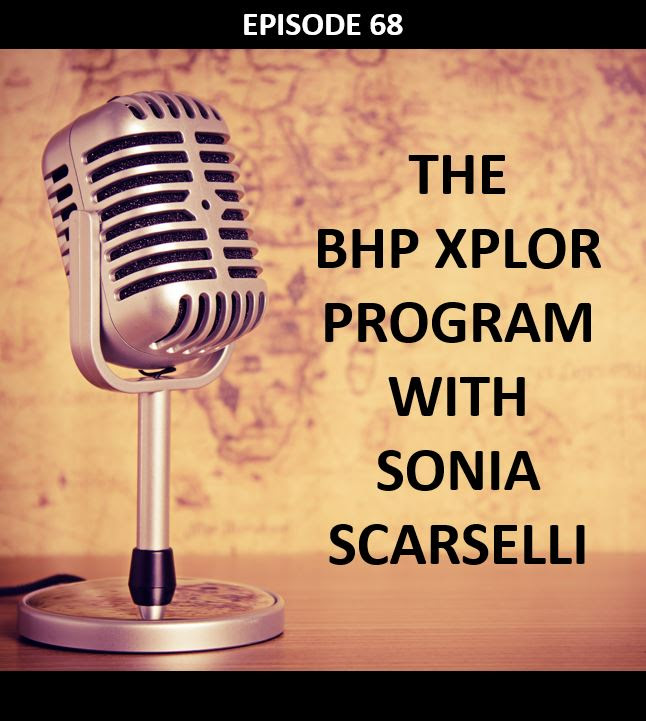
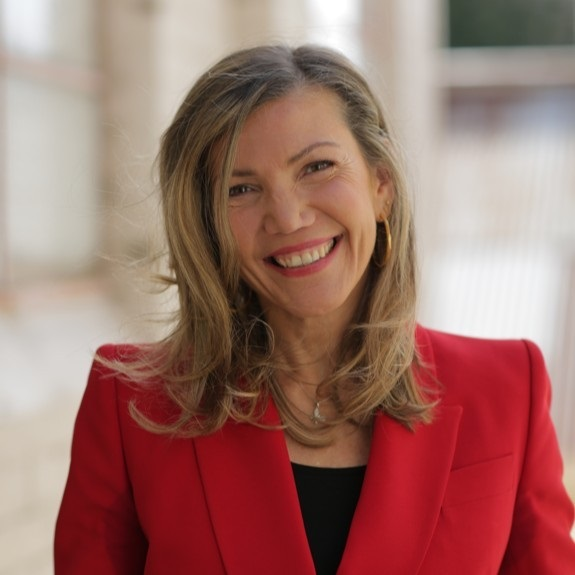

Defining Discovery with Scott Briscoe episode #66 and episode #67
How can something so fundamental to mineral exploration, like the nature of what constitutes a discovery, have such a poorly accepted industry-wide definition?
Maybe it is like the old adage, if you do not know which port you are sailing to, then no wind is favourable. Does that mean no one can define discovery if everyone can define discovery?
On this episode, we are joined by Scott Briscoe, and we try to understand what constitutes a discovery in mineral exploration.
Join us and let’s explore.
#ExplorationRadio


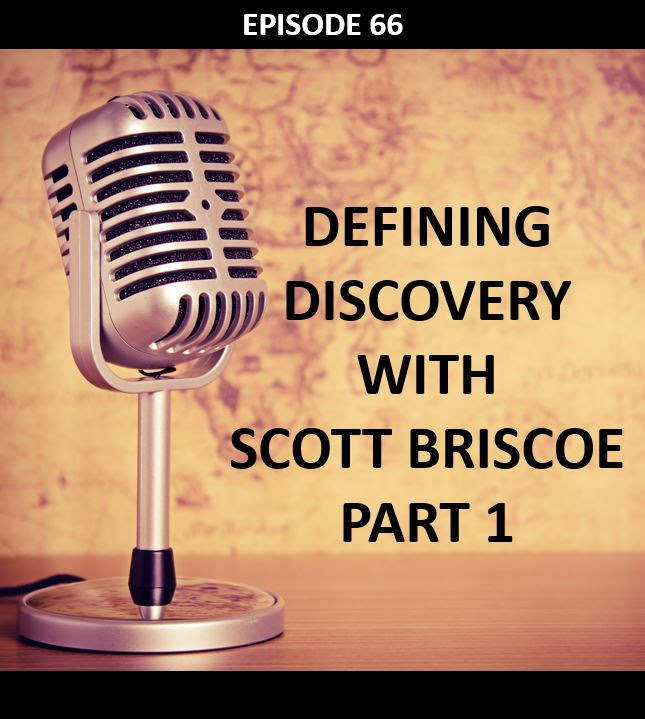
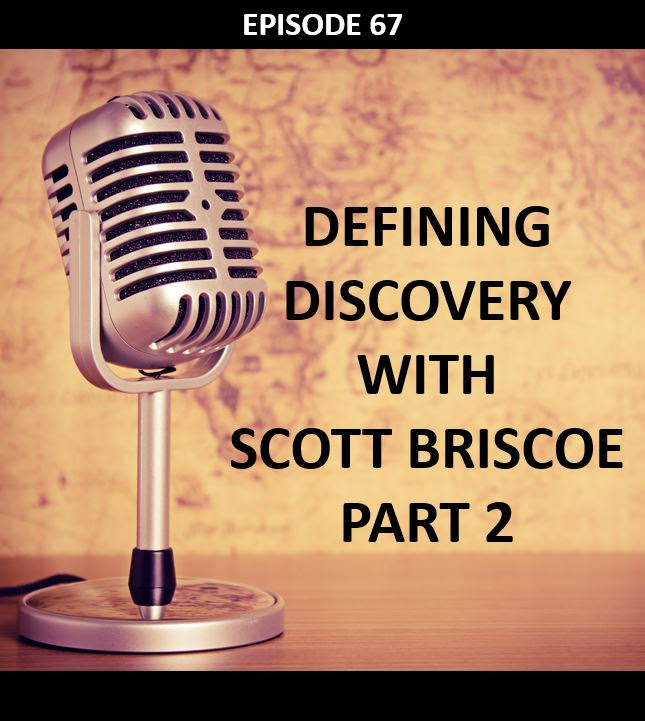

We sadly announce the passing of Dr Jack Hallberg, one of the ‘greats’ of Western Australian geology. Jack was a devoted husband, father and in recent times, grandfather, and was very well-known as a buyer and seller of a diverse range of collectibles – comics, baseball cards and most recently Pokemon cards.
But it is his contribution to geology of the Yilgarn Craton that places Jack in a category of his own. Jack arrived in Perth in 1967 as a young Stanford graduate with some field experience, and commenced a ‘nickel-boom’ PhD project on the basalts in the Eastern Goldfields region, in synch with Cory Williams, who studied the ultramafics. These studies advanced the understanding of the region and yielded not only a number of landmark joint papers but lifelong friendships. Mary Jo arrived from the US to marry Jack during these PhD years and has been his no.1 fan ever since. Mary Jo, along with Cory’s spouse Gwynn, were introduced to life with field geologists through spartan camping trips, always close to good rocks, and often with a broader gaggle of geologists, such as fellow post grad student, Max Bye.
One of Jack’s passions was rugby union and every winter Saturday, in the late 60’s and early 70’s, he and Mary Jo were fixtures at University of Western Australia rugby matches. Jack was a very capable prop and his affable personality transformed to being a ferocious competitor during the game. He and Mary Jo were a key part of an amazing group that remain in contact today. In legendary post-match celebrations, Jack was often asked about his accent and nationality. He explained that he was Canadian by marriage.
Jack joined CSIRO in 1971 and completed numerous small projects before embarking on a seven-year study of the Leonora-Laverton area. When CSIRO baulked at publishing this work, Jack, with support from exploration geologist Barry Fehlberg, ‘self published’ the work, which rapidly became a cornerstone for exploration and mapping studies in the region and remains so in the 2020s. This project lead Barry and Jack to form Hallberg Mapping Services and the compilation of at least 347 (!!!) 1:25,000 map sheets focused on the most productive greenstone belts in the Yilgarn Craton. But this was not just ‘mapping’. Jack’s keen eye, extensive knowledge of Archaean rocks, meticulous compilation skills and equally importantly his ‘hallmark’, always spartan, approach to (solo) field mapping, have made his maps an extraordinarily valuable resource for explorers. Jack retired from full-on mapping in the early 2000s, but maintained a connection to industry through conferences, courses and the occasional specialised mapping gig. He was ever keen to share his knowledge with others, particularly younger geologists. He maintained connections with teammates from UWA rugby club, and UWA classmates at annual re-union lunches.
We extend our deepest sympathies to Mary Jo, his loving spouse of over 50 years, their sons Russell and Jeffrey and their extended families.
A funeral service for Jack will be held in Albany on Wednesday Jan 25 and 2.30pm Western Standard Time, and will be streamed live.
The details and link for tributes can be found at HERE
From Barry Fehlberg, Cory Williams, Chris Fitzhardinge and Dave Isles
This article is based on a talk we recently presented at the Australasian Groundwater Conference 2022 in Perth. AGC22 is a hydrogeology dedicated event run by the International Association of Hydrogeologists (IAH) Australian chapter. This paper was developed to present (again) the importance of professionalism and competency within our industry, and is a renewed effort to raise our levels of competency and professionalism aligned to increasingly connected public perceptions. This paper was hydrogeology focussed but certainly has relevance across the broader geoscience community.
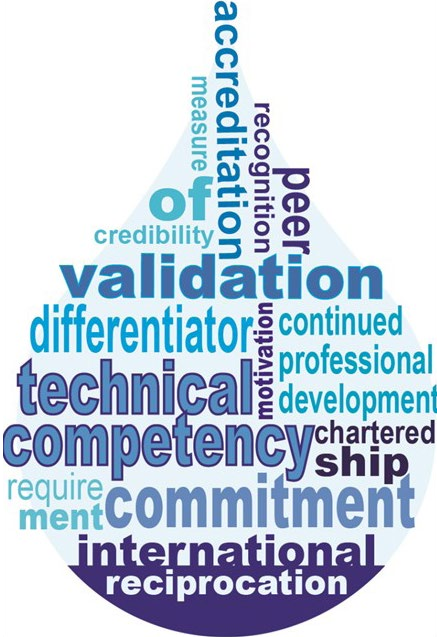
The Australian Council of Professions (ACOP, 2003) provide a concise description of professionalism, key elements to this paper are highlighted and underlined:
These are powerful and meaningful statements. Professionalism and public awareness of our qualifications and experience is becoming more important as society and industry expectations of our work becomes increasingly raised through heightened ESG awareness, the need for competent technical water management advice surrounding the challenges associated with the transition away from the carbon economy, the focussed recognition (for example through the GISTM) of the need for our specialist services, and a greater demand for information and public awareness through social media.
Our corner of the geoscience sector currently lacks this public transparency and industry professional commitment.
In an exercise separate to the paper but directly relevant, co-author Doug brown initiated a feedback request from the existing pool of RPGeo (Hydrogeology) professionals, framed around the question “Why did you become an RPGeo (Hydrogeology) through the AIG?”
The results were combined into a word map which provides a valuable sense of professional meaning and purpose to those already committed. This aligns very well with the description of a profession after ACOP, and the proposed mechanisms of career adaptation presented in this paper.
Hydrogeologists have traditionally aligned their professional careers with the IAH.
This shouldn’t change.
The IAH is a critically important learned society that provides international information sharing and opportunities to converse, meet and present the work we do to like-minded professionals. But the IAH does not have a Code of Ethics, nor does it have a process of technical membership scrutiny, or a process to assess complaints in an equitable and efficient manner.
The AIG fills that gap.
Membership to the AIG and to the elevated RPGeo status includes application review and scrutiny, and for RPGeo status, there is the added obligation of logged CPD (continuing professional development). This latter element is important as we transition toward life-long-learning as opposed to a single degree qualification to serve a 40+ year career.
The AIG is therefore a partner to the IAH, NOT a competitor!
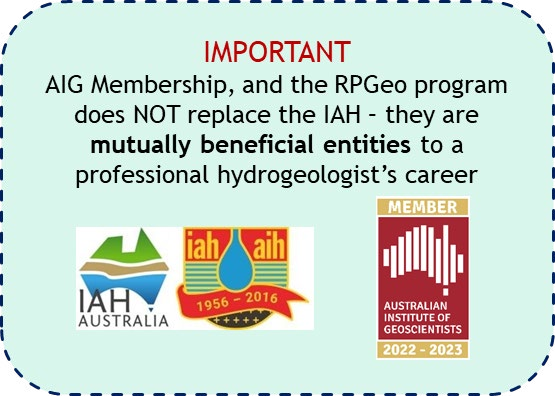
The Australasian Code for Reporting of Exploration Results, Mineral Resources and Ore Reserves (‘the JORC Code’, JORC : Mineral Resources and Ore Reserves) is a professional code of practice that sets minimum standards for public reporting of minerals exploration results, mineral resources and ore reserves. Although JORC does not require RPGeo status (it requires competency, which is described in detail in (JORC Competent Person – A baseline review in a global context | Australian Institute of Geoscientists (aig.org.au))), it started the process of professional recognition, and competent person (CP) accreditation within the Geoscience community.
The key to understanding the relevance of this is to understand the JORC Code purpose – it provides a mandatory system for the classification of minerals exploration results, mineral resources and ore reserves, and reports that are prepared under the code are completed for the purpose of informing investors or potential investors and their advisors. The JORC Code is not a how-to-do-geology guide – it is a system of common language and communication tools.
In the context of hydrogeology, a similar code would be of value – again, aimed not at how-to-do-hydrogeology, rather how to report in a manner that meets the three JORC Code criteria of competency, transparency and materiality. Such a guide does not need to be long or technical, and work in this space has already commenced by others with similar professional sentiments to the authors of this paper. More of this will come in due course as this presentation is expanded on.
Accountants, dentists, engineers, financial advisors, legal practitioners, medical practitioners, registered nurses and teachers are all obligated to meet varying degrees of membership / professional registration standards in Australia (JORC Competent Person – A baseline review in a global context | Australian Institute of Geoscientists (aig.org.au)). Geoscientists who operate to the JORC Code have to also meet CP requirements.
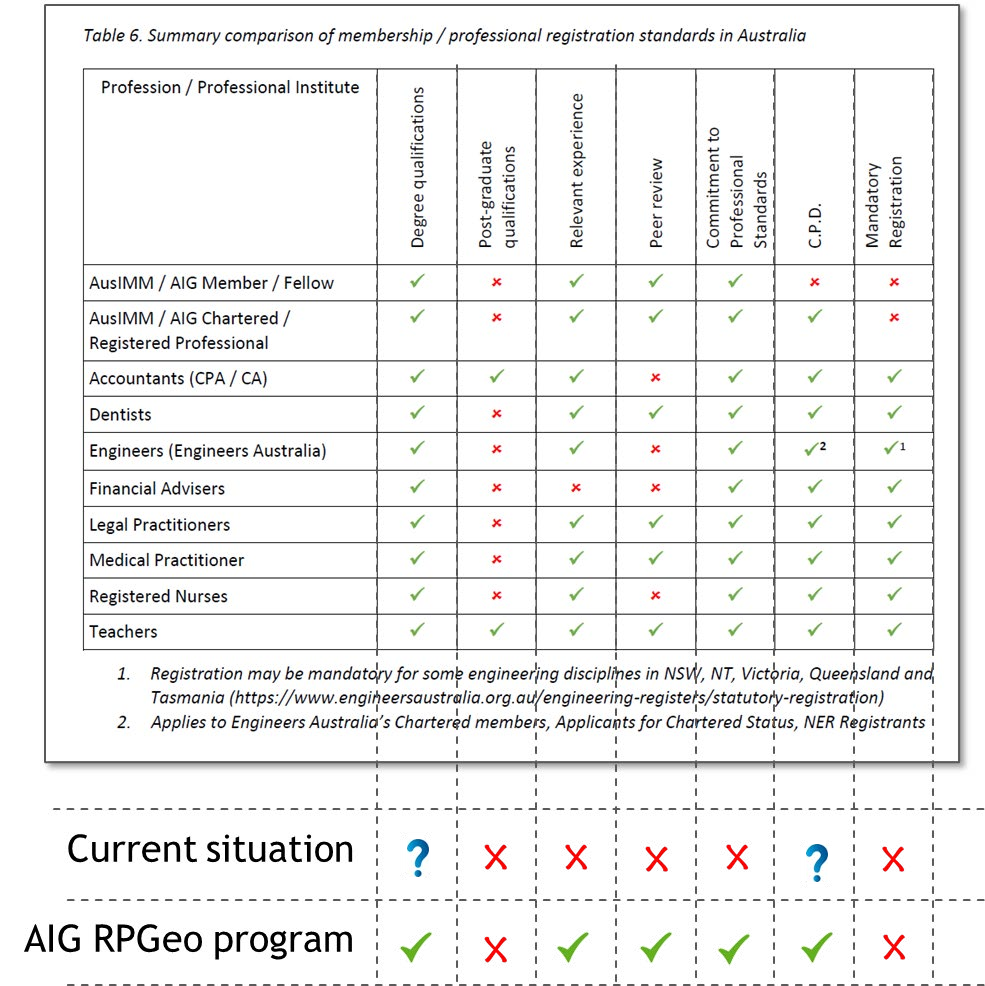
Hydrogeologists in Australia currently have no such obligation.
The RPGeo program provides this missing link between public communication and industry professionalism, and does so with independent scrutiny of experience and qualifications.
Anyone can theoretically call themselves a Principal hydrogeologist, but only those who have applied for and meet the requirements of RPGeo can claim to be an RPGeo. This is a very important differentiator for the public.
It is further noted that international project engagement is now a common component to most hydrogeologists’ careers. When compared with other jurisdictions, Australia is lagging in this regard. To practice as a Hydrogeologist in Canada for example, you need Provincial or Territorial accreditation as a P.Geol, in the UK, you need to be a Chartered Geologist. Numerous other countries have the same or similar requirements.
Australia has some of the worlds’ best hydrogeologists. International reciprocal recognition of our credentials has no chance though without some form of established competency or accreditation process.
It is up to us to raise our standards, not to ask our international colleagues to lower theirs.
So what is actually being asked of here?
On a scale of 0 to 10, where:
We are suggesting that the RPGeo program falls at about a “6/10” – it achieves professional accreditation (without need for registration), it is a peer reviewed process which represents independency, it commits the member to a Code of Ethic and Complaints Review process, it provides the CPD needed to maintain currency in experience, it conveys willingness for public scrutiny and is a proactive means of leadership in our industry through self-commitment rather than an imposed criteria out of our control.
This score, because of the willingness for public openness, is also the start of the “level playing field”.
Currently, you could argue our industry sits about a “1-2/10” on the same scale.
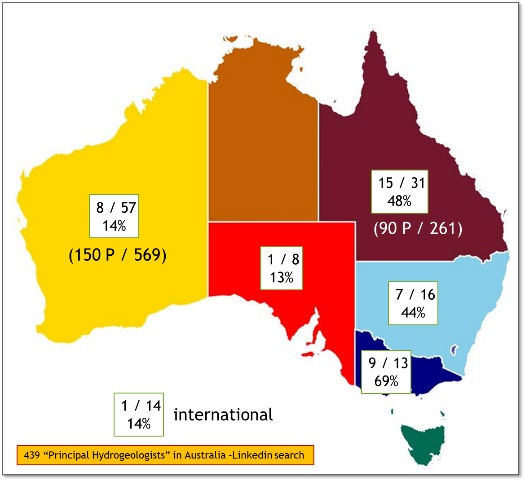
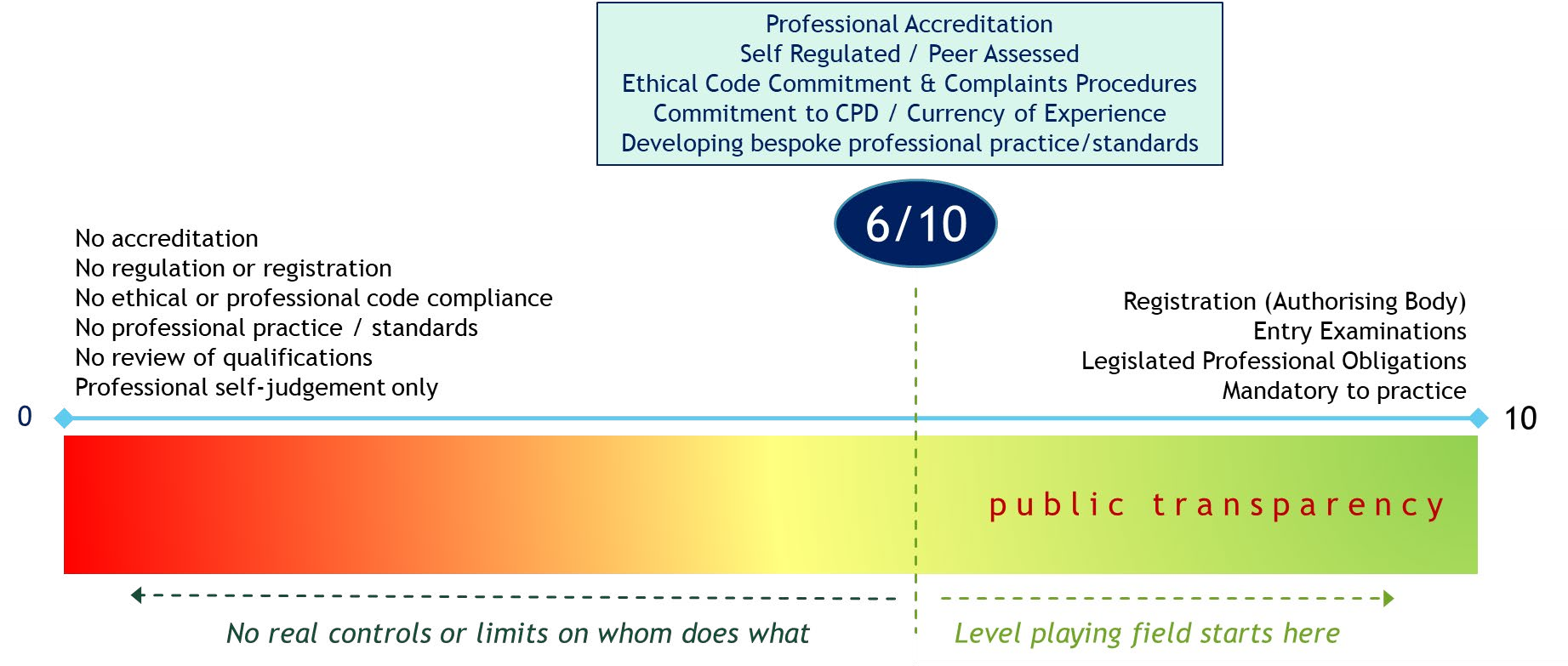
There have been many arguments used to discourage such membership in previous attempts. Some of those that have been heard by the authors include:
None of these appear relevant or defensible considering today’s global challenges.
Increasing awareness of ESG (especially in water management), increasing awareness of the need for technical competency and the roles that hydrogeology plays in larger projects, public awareness and perceptions, and professional pride in the work we do, are all easy deflectors to these arguments.
It is hoped that the large number of emerging leaders in our field also see the value of this, and in so doing recognise that leadership is not just a process of promotion from the local HR department – it is about contributing to positive change.
That is fundamentally what this process is about. Positive change, industry improvement and public awareness.
We concluded this paper not with a “next steps list”, rather a future vision of what we hope will develop:
We encourage discussion on this, feel free to reach out to the authors.
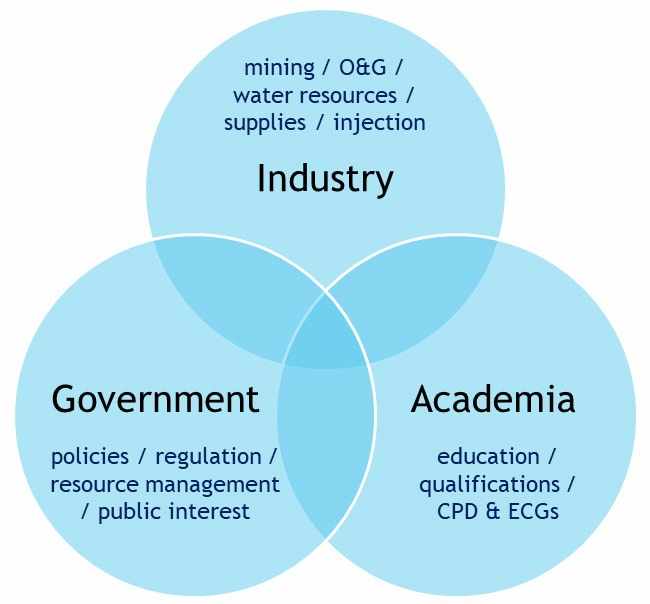

#65 – Ideas That Must – Part 6
At the end of our interviews, Steve and Ahmad always ask the guests two questions: what is something they think needs to live or be maintained in the mining industry at all costs; and what is something that needs to die or be jettisoned out of our industry?
We thought it would be interesting to put together some of the responses we have received to those questions over the past year.
So on this episode of Ideas that Must Die and Live in Mining, we are joined by, Mike Porter, Evren Pakyuz-Charrier, Tim Foden and Shaun Usmar.
Join us and let’s explore.
#ExplorationRadio


